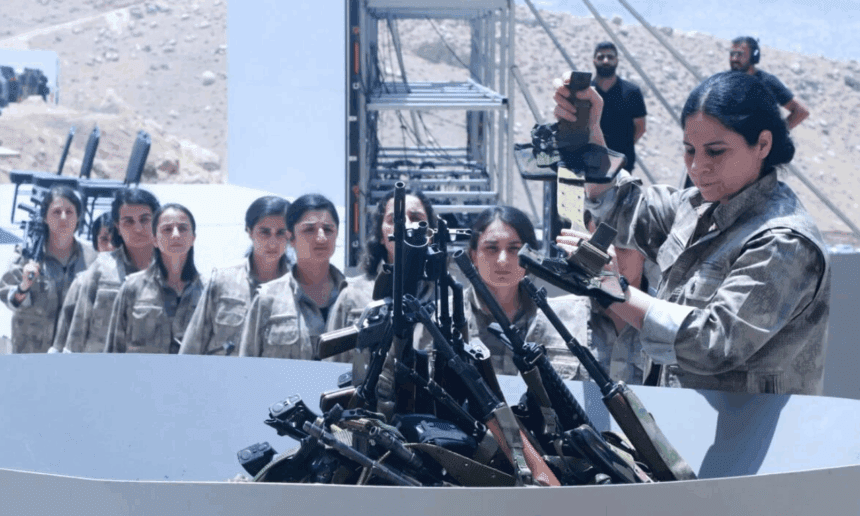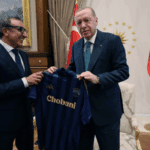The Turkish parliament is preparing legislation that would allow PKK members who voluntarily lay down their arms to have terrorism-related charges dropped.
A special parliamentary commission has been formed to draft the law, which aims to provide a clear legal framework for reintegrating disarmed militants into society. The commission is expected to define the legal consequences for former PKK members who abandon armed struggle, including the potential dismissal of prosecutions, investigations, and ongoing trials related solely to terrorist group membership.
This effort is part of the “Terrorism-Free Turkey” roadmap supported by the ruling Justice and Development Party (AKP). According to officials, current laws—especially the so-called “effective remorse” provisions—are insufficient to address the complexities of disarmament and reintegration. The proposed legislation would introduce a formal verification process and offer legal amnesty to individuals whose disarmament is confirmed, although those accused of serious crimes like murder would still face prosecution.
“If someone has laid down arms and this is verified by state institutions, any pending charges for terrorist group membership will be dropped,” an AKP official said. “But other crimes, particularly those involving violence against civilians or security forces, will still be prosecuted.”
The legislative push follows a symbolic and widely publicized ceremony on July 11 in Sulaymaniyah, northern Iraq, where 30 PKK fighters publicly destroyed their weapons. The event was described as the group’s first formal step toward ending its four-decade-long armed campaign against the Turkish state.
The revival of peace efforts began in October 2024, when Nationalist Movement Party (MHP) leader and government ally Devlet Bahçeli made a surprise appeal to imprisoned PKK leader Abdullah Öcalan. Bahçeli urged Öcalan to call on the PKK to end its armed struggle—a request to which Öcalan responded in February with a message urging the group to disarm and dissolve.
The commission’s proceedings will be closed to the public but will produce full transcripts of its deliberations. Legal experts, former officials who participated in the previous peace process (2013–2015), representatives from civil society, and academics will be consulted in the drafting of the new law.
Additionally, each ministry will be expected to contribute to the development of a reintegration policy package. This will include programs for education, vocational training, employment, and military service exemptions for returning militants who disarm voluntarily and are cleared of serious crimes.
According to Turkish media, the National Intelligence Organization (MİT) will submit regular field reports to the commission, tracking disarmament efforts and regional dynamics. Should it be deemed necessary, a delegation may also be formed to meet with Öcalan to facilitate further negotiations—a move that would mark the first official contact with the PKK leader since his February statement.
Despite the law being tailored specifically to PKK militants, government sources stressed that the broader legal framework—particularly the Turkish Penal Code (TCK) and Counterterrorism Law (TMK)—will remain fully applicable to other groups deemed terrorist organizations by the Turkish state.
In a joint statement released Thursday, 166 civil society organizations—including the Human Rights Association (İHD), Peoples’ Democratic Congress (HDK), and Unity for Democracy (DİB)—called for greater participation in the commission’s work. They urged parliament to establish inclusive mechanisms that ensure transparency, gender balance, and democratic accountability.
“Peace cannot be achieved in isolation,” the statement said. “A sustainable and just reconciliation process must be inclusive of civic voices and reflect the democratic aspirations of all segments of society.”
The commission will convene for its first official meeting on August 5 at 11:00 a.m., according to an invitation circulated by Parliament Speaker Numan Kurtulmuş. The 51-member body will include representatives from across the political spectrum: 21 from the ruling AKP, 10 from the main opposition Republican People’s Party (CHP), four each from the pro-Kurdish Peoples’ Equality and Democracy Party (DEM) and the MHP, and three from the recently merged New Path Party.
Smaller parties, including the Workers’ Party of Turkey (TİP), the Labor Party (EMEP), the Free Cause Party (HÜDA PAR), the Democratic Left Party (DSP), and the New Welfare Party (YRP), will each be represented by one member. The nationalist İYİ (Good) Party and the centrist Democrat Party have not yet confirmed participation, with announcements expected after the Democrat Party’s August 4 meeting.
Even before its first meeting, the commission has become the subject of political debate over its official name. Journalist Yıldız Yazıcıoğlu noted in a post on X (formerly Twitter) that various names have been floated: “Commission for a Terrorism-Free Turkey” by TRT, “Brotherhood and Solidarity Commission” favored by the MHP, and “Commission for a Livable Turkey” proposed by SP leader Mahmut Arıkan.
MHP Deputy Chair Feti Yıldız weighed in to clarify the party’s stance, asserting on X: “The name of the commission is the National Unity and Solidarity Commission.”
Still, no final decision has been made, and the debate over the commission’s name is expected to continue into its inaugural session.



